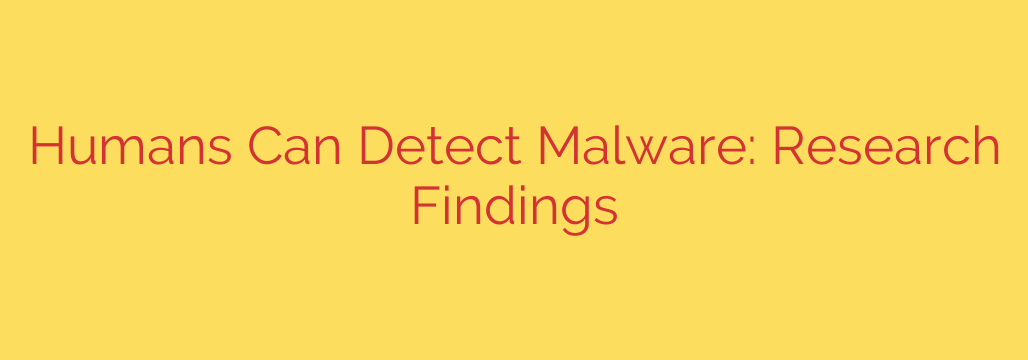
Trust Your Gut: How Human Intuition Can Detect Malware Before It Strikes
Have you ever opened an email or visited a website and felt that something was just… off? You might not have been able to pinpoint the exact reason, but a small voice in your head whispered, “This isn’t right.” It turns out that this gut feeling is more than just paranoia; it’s a powerful, and often overlooked, tool in the fight against malware and cybercrime.
While we rely heavily on antivirus software and firewalls to protect us, new insights reveal that human intuition is an incredibly effective layer of defense. Your brain is a remarkable pattern-recognition machine, and that ability can help you spot threats that even sophisticated software might miss.
The Science Behind Your Security “Sixth Sense”
Recent studies have explored this very phenomenon, confirming that people—even those without technical expertise—are surprisingly good at identifying malicious content. When presented with a mix of safe and dangerous websites, emails, and software prompts, participants consistently identified threats at a rate significantly better than chance.
What are they picking up on? It’s often a combination of subtle cues that disrupt our expectations of what is normal and safe online. These can include:
- Slightly incorrect logos or branding.
- Unusual or stilted language and grammatical errors.
- A sense of urgency or pressure that feels manipulative.
- Website layouts that seem unprofessional or hastily put together.
Our brains are wired for pattern recognition, and this ability can be a powerful tool against cyber threats. When a scam email deviates from the thousands of legitimate emails you’ve seen before, your brain flags it as an anomaly. This initial “gut feeling” is your first and best warning sign.
Why Your Vigilance Is More Important Than Ever
Cybercriminals are constantly evolving their tactics. They use social engineering to prey on human psychology, creating scams that are designed to bypass technical filters. An email might not contain a virus itself, but it might trick you into revealing a password or downloading a malicious file. This is where the human element becomes critical.
Even the most advanced security software can be bypassed, making human vigilance the critical last line of defense. Antivirus programs are excellent at catching known threats, but they can struggle with brand-new “zero-day” attacks or highly convincing phishing schemes. Your critical thinking and intuition fill that gap. Ignoring that nagging feeling of doubt can be the difference between staying safe and falling victim to an attack.
Actionable Tips to Sharpen Your Malware-Detecting Intuition
Trusting your gut is a great start, but you can train yourself to be even more effective. By consciously looking for red flags, you can turn a vague feeling into a concrete and reliable defense mechanism.
Here are the key things to watch out for:
Scrutinize the Sender. Don’t just look at the display name. Carefully examine the actual email address. A message from “PayPal Support” that comes from an address like
[email protected]is an immediate red flag.Analyze the Tone. Legitimate organizations rarely use high-pressure tactics. Be wary of emails that create a false sense of urgency, threatening to close your account, release embarrassing information, or demanding immediate payment.
Hover Before You Click. Before clicking any link, hover your mouse over it to see the actual destination URL in the bottom corner of your browser. If the link text says
YourBank.combut the preview shows a strange, unrelated address, do not click.Question Unexpected Attachments. Ask yourself: “Was I expecting this file?” Cybercriminals often disguise malware as invoices, shipping confirmations, or résumés. If you didn’t request it, treat it as hostile until proven otherwise.
Look for Signs of Low Quality. Phishing emails and malicious websites are often riddled with typos, grammatical mistakes, and low-resolution images. Professional companies invest in quality control; scammers often don’t.
By adopting a mindset of healthy skepticism and paying attention to these details, you empower yourself. The goal isn’t to be fearful of the internet but to navigate it confidently and safely.
Ultimately, the most powerful security tool is a cautious and informed user. The next time you feel that something is off online, don’t dismiss it. Pause, investigate, and trust your gut. It might just be the thing that keeps you safe.
Source: https://go.theregister.com/feed/www.theregister.com/2025/08/05/human_malware_detection/








